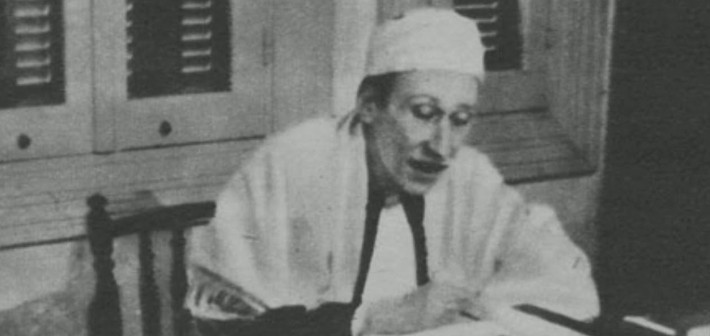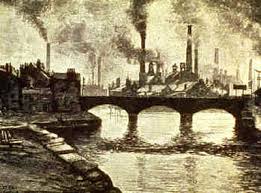
“Everything seems to be increasingly artificial, denatured, and falsified”
René Guénon (1886-1951) was a Sufi philosopher and important 20th century critic of Western industrial capitalist civilization.
Because his primary interest was metaphysics rather than ideology, Guénon is sometimes regarded as apolitical.
But there is a strong organic radical dimension to his thought. In his early life he was heavily influenced by the anarcho-Sufi Swedish artist Ivan Aguéli (1) and by Gérard Encausse, part of an alternative spiritual scene embracing feminism, homeopathy, anarchism and animal rights. (2)
Guénon’s own traditionalist or perennialist philosophy was an appreciation of the age-old and timeless universal human wisdom at the esoteric core of all the world’s major religions.
He abandoned his native France to spend the rest of his life in Egypt, with the new name of Abd al-Wâhid Yahyâ, and condemned all nationalism as “essentially opposed to the traditional outlook”. (3)
Like his friend Ananda Coomaraswamy, Guénon was appalled by Western imperialism and the way in which it everywhere imposed its exploitative, productivist, industrial way of life.

In 1927’s The Crisis of the Modern World, he described the concept of “civilization” as a pretext designed to fool the public, “mere moralistic hypocrisy, serving as a mask for designs of conquest or economic ambitions”. (4)
He poured scorn on the idea that capitalist powers like Britain or France were “improving” the lives of indigenous peoples by colonising them.
He wrote: “It is really an extraordinary epoch in which so many men can be made to believe that a people is being given happiness by being reduced to subjection, by being robbed of all that is most precious to it, that is to say of its own civilization, by being forced to adopt manners and institutions that were made for a different race, and by being constrained to the most distasteful kinds of work, in order to make it acquire things for which it has not the slightest use”. (5)
For Guénon, the whole Western idea of work, the idea that people should be made to spend their lives producing goods and profit, was abhorrent.
He wrote: “The modern West cannot tolerate that men should prefer to work less and be content to live on little; as it is only quantity that counts, and as everything that escapes the senses is held to be non-existent, it is taken for granted that anyone who is not in a state of agitation and who does not produce much in a material way must be ‘lazy’”. (6)
Guénon saw capitalist modernity as a hideous affront to everything that was traditionally important to human beings. It promoted objects above people, quantity above quality, money above life.
In 1924 he wrote in East and West: “Modern civilization suffers from a lack of principles, and it suffers from it in every domain. By a monstrous anomaly, it is, alone, among the others, a civilization without principles, or with only negative ones, which amounts to the same thing. It is as if an organism with its head cut off went on living a life that was at the same time intense and disordered”. (7)

Inseparable from the insanity of this foul Western civilization was the industrialism with which it expanded and imposed its power.
He observed: “What the modern world has striven after with all its strength, even when it has claimed in its own way to pursue science, is really nothing other than the development of industry and machinery; and in thus seeking to dominate matter and bend it to their service, men have only succeeded in becoming its slaves”. (8)
Twenty years before Guy Debord wrote The Society of the Spectacle, Guénon identified modern Western society in 1945 as one in which “everything seems to be increasingly artificial, denatured, and falsified”. (9)
The falsity of this society extended to the way it encouraged people to think – or rather, not to think. If the public could understand clearly what was going on it “might endanger certain political interests”, Guénon suggested.
This would explain why the education system favoured certain methods over all others: “Consciously or not, they begin by removing everything that might make it possible to see things clearly, and that is how ‘public opinion’ is formed”. (10)
As an example of this, he cited the way that philosophy had increasingly been dominated by academics who focused on narrow facts and details at the expense of the bigger picture.
Guénon complained: “What interests them is not whether a certain idea is true or false, or in what measure it is so; their only concern is to find out who first propounded the idea, in what terms he formulated it, and at what date and under what accessory circumstances he did so; and this history of philosophy which busies itself exclusively with the scrutiny of texts and biographical details, claims to take the place of philosophy itself, thus bringing about its final divorce from any small intellectually valuable residue that it might have retained in modern times. By clinging to the letter only, it is unable to enter into the spirit”. (11)
He noted elsewhere: “Modern man, instead of attempting to raise himself to truth, seeks to drag truth down to his own level”. (12)
 Guénon described how the Western system deliberately used this disconnection from the truth to keep its victims in a permanent state of disempowered delusion: “The great ability of those who are in control in the modern world lies in making the people believe that they are governing themselves”. (13)
Guénon described how the Western system deliberately used this disconnection from the truth to keep its victims in a permanent state of disempowered delusion: “The great ability of those who are in control in the modern world lies in making the people believe that they are governing themselves”. (13)
The biggest lie of all was the absurd optimism projected in the notion of “progress”, the idea that industrial development had improved human society and would continue to do so in the future.
Guénon identified instead “a change that is the direct opposite of ‘progress’, amounting indeed to a veritable regression of intelligence”. (14)
This cultural regression, which went hand in hand with economic growth, was rapidly gathering speed, he thought, like “a mobile body running down a slope and going faster as it approaches the bottom”. (15)
In these circumstances, a “mere readjustment” of society would not be enough and Guénon welcomed the opportunity for “a complete renovation”. (16)
And how might this renovation be achieved? “Modifying the mental outlook of a people is the one and only means of bringing about any deep or lasting change”. (17)
Video link: Guénon, Coomaraswamy, Schuon, Burckhardt, Pallis and Nasr (13 mins)

1. Robin Waterfield, René Guénon and The Future of the West: The life and writings of a 20th-century metaphysician (Wellingborough: Crucible, 1987), p. 41.
2. Mark Sedgwick, Against the Modern World: Traditionalism and the Secret Intellectual History of the Twentieth Century (New York: Oxford University Press, 2009), pp. 45-48.
3. René Guénon, The Crisis of the Modern World, trans. by Arthur Osborne, Marco Pallis & Richard C. Nicholson (Ghent NY: Sophia Perennis, 2001), p. 98.
4. Guénon, The Crisis of the Modern World, p. 92.
5. Ibid.
6. Ibid.
7. René Guénon, East and West, trans. by Martin Lings (Hillsdale NY: Sophia Perennis, 2004), p. 106.
8. Guénon, The Crisis of the Modern World, p. 87.
9. René Guénon, The Reign of Quantity and the Signs of the Times, trans. by Lord Northbourne (Hillsdale, NY: Sophia Perennis, 2004), p. 192.
10. Guénon, East and West, p. 15.
11. René Guénon, Introduction to the Study of the Hindu Doctrines, trans. by Marco Pallis (Hillsdale, NY: Sophia Perennis, 2004), p. 215.
12. Guénon, The Crisis of the Modern World, p. 66.
13. Guénon, The Crisis of the Modern World, p. 74.
14. Guénon, The Crisis of the Modern World, p. 50.
15. Guénon, The Reign of Quantity and the Signs of the Times, p. 43.
16. Guénon, The Crisis of the Modern World, p. 17.
17. Guénon, Introduction to the Study of the Hindu Doctrines, p. 250.
